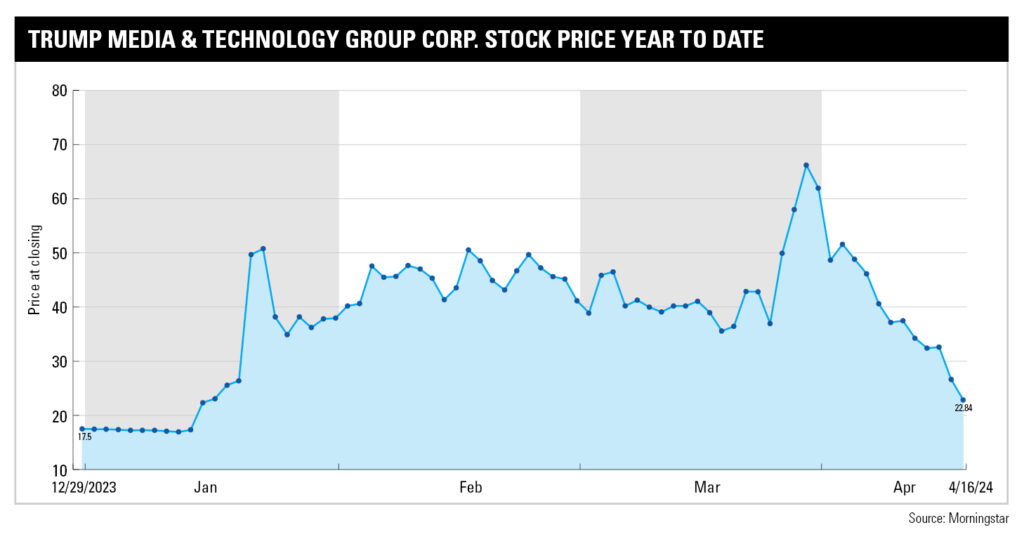

The most unusual and controversial stock at the moment, Trump Media, is being described as “abnormally dangerous” for the niche of retail investors who have been buying it.
But the affinity some investors have for the stock and the powerful demand to short it also make it risky to bet against.
“The general consensus on Wall Street is that it’s only retail investors who are in the long position. It’s Trump supporters,” said John Rekenthaler, director of research at Morningstar. “It’s an affinity stock… You want Truth Social to succeed because you want Donald Trump to succeed.”
While the roughly 600,000 individual investors Trump Media has said it has attracted are almost certainly supporters of the former president, the people betting against the stock don't appear to be motivated by politics, but they are more than likely institutional investors, Rekenthaler said.
“It’s fair to say that all the long investors will be voting for Donald Trump in November,” he said. “I don’t think all the shorts are voting for Joe Biden.”
With the news this week that Trump Media may sell additional shares, the stock’s price fell considerably, going from over $32 per share at market close on Friday to less than $26 per share by close on Monday. As of Tuesday’s close it went down further, to under $23.

When the stock started trading on March 26 following its merger with special purpose acquisition company Digital World Acquisition Corp., its price was nearly $71, and it reached a high of more than $79 that same day.
If there’s any advice that financial professionals can agree on, it's to avoid the stock altogether.
“It is a great way to destroy wealth and will most likely end in loss of capital and disappointment. Speculative investment strategies may be fun to discuss with friends or post on the internet, but someone always loses in the end,” Chris Mankoff, chief portfolio strategist at JTL Wealth Partners, said in an email. “I would ask them to imagine how they would feel if they bought or shorted a stock and saw the value drop 30 percent, 50 percent, 70 percent, or 90 percent over several days or weeks, and if they would still make that same ‘investment.’”
Avoiding meme stocks in general is prudent, but even more so for Trump Media currently, said Douglas Tees, chief operating officer at Jason Howell Co.
“On the long side, you have to believe that fundamentals won't matter or that there is a new variable that will emerge specific to this stock,” Tees said in an email. “On the short side, you not only have to be right – you have to time it correctly as well.”
Even for experienced financial professionals, shorting, particularly for a meme stock, is dangerous territory, given the necessity for precise timing, said Paul Monax, financial planner at Agile Wealth.
“If you get in now and the stock goes down next week or next month, you timed it just right and can jump for joy. On the other hand, what happens if it that stock gets propped up by the company or artificially by the market, as happened to meme stocks in 2021?” Monax said in an email. “There were professionals who got killed in 2021, put out of business because the market got propped up and they couldn’t hold on long enough for their bet to eventually become right.”
Anyone considering shorting Trump Media should at least consider the story of hedge fund Melvin Capital, which was forced to shutter in 2022 after devastating losses on short positions on the stock of GameStop. The meme stock frenzy showed the power of amateur investors working together to help pump up prices without correlation to fundamentals.
Of course, GameStop, AMC, and other meme stocks that skyrocketed during the pandemic have declined since then, but the way down was volatile and lengthy. After tripling from about $1 per share to $3 in 2020, Game Stop shot up to more than $81 – briefly – before going back down to $10 in a matter of days. Soon after, it went back up to as much as $66 but since then has trended down, hitting just over $10 as of Tuesday.
AMC, which got pushed as high as $230, is currently trading at under $3.
With Trump Media, there has been more interest in betting against the stock than the market can reasonably handle. Although it was expensive at the end of March to borrow shares, at 150 percent, annual financing costs increased to as much as 900 percent by early April but quickly went down to over 300 percent, according to data from S3 partners reported by CNBC and Reuters.
Given the high borrowing costs, it would be all but impossible now to make money shorting the stock, said Matthew Tuttle, CEO of Tuttle Capital Management, an ETF shop.
He's personally interested in buying the stock on dips and would buy puts on it as well, though he would not “bet against Donald Trump,” Tuttle said. But he isn’t shy about shorting companies based on ESG policies – one ETF his firm is preparing intends to use at least 80 percent of its net assets to short companies that incorporate environmental, social or governance considerations in their operations.
Even so, “there are certain companies that are able to make use of their ideology,” Tuttle said. “On the other side, I don’t think being liberal hurts Ben & Jerry’s.”
That doesn’t mean that Trump Media is a good stock to buy, he said.
“I would not invest in it from a buy-and-hold standpoint, because looking at the financial metrics today, it looks like a pretty crappy company,” Tuttle said. “Before Elon Musk took over X, you could make an argument for a great use case for Truth Social.”
As of February, Truth Social had just under 500,000 active monthly users, according to data from Similarweb reported by CNN. Trump Media doesn't publicly report its user numbers. Still, its users are estimated to be a very small fraction of the user bases of other social media companies. X, formerly Twitter, reports having more than 500 million active monthly users.
“It’s an abnormally dangerous stock because there is no real basis underlying it. When you look at other so-called meme stocks that have been put as expensive or gimmicky … they still had something of an underlying business,” Rekenthaler said. “There’s a lot of room to fall if it were to be priced like other companies. There is a massive amount of value in the stock that is based on the Trump brand… without the size of the business.”
Although Tuttle doesn’t encourage trading the stock, “there is a whole group of retail guys who grew up in the AMC and GameStop [era]… and they know how to handle stuff like this,” he said. “It’s a meme stock, but it’s even meme-ier than those other meme stocks because it’s got Donald Trump in it. You’ve got an extremely loyal fan base that doesn’t know what it’s doing.”
What could affect the stock price going forward, perhaps more than anything, is how well Trump does in the polls, Rekenthaler said. Trump Media might only have value after November if he wins the election, he noted.
“This stock I don’t think would survive him not surviving the election,” he said. With the civil and criminal cases facing the former president, “how the trials go will push the stock up or down depending on what the news is.”
But there will be a big test before the election, as insiders, including Trump, see the end of the six-month lockup on holding their shares.
“That will put pressure on the stock," Rekenthaler said. "There will be insider selling – there’s no question about it.”
Something for retail traders to consider is whether Trump will be showing "diamond hands," given the proportion of his net worth that is in the company, as well as the need he might have for cash.
Even as shareholders reacted to the announcement by the company this week that insiders could sell shares, that part was already disclosed long ago, Rekenthaler said.
“The warrants have been out there for two years,” he said. “It feels like a lot of people own this stock but don’t fully understand it… Everything about this stock is strange."

Executives from LPL Financial, Cresset Partners hired for key roles.

Geopolitical tension has been managed well by the markets.

December cut is still a possiblity.

Canada, China among nations to react to president-elect's comments.

For several years, Leech allegedly favored some clients in trade allocations, at the cost of others, amounting to $600 million, according to the Department of Justice.
Streamline your outreach with Aidentified's AI-driven solutions
This season’s market volatility: Positioning for rate relief, income growth and the AI rebound
